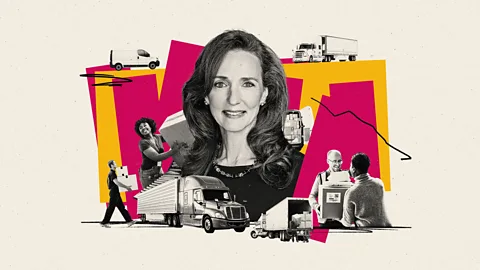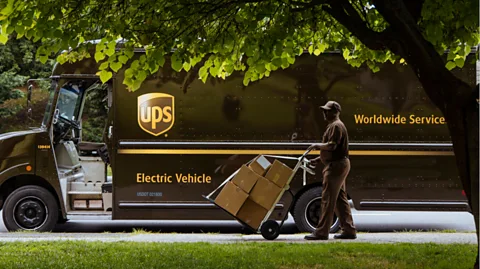UPS's road to carbon neutrality
 Klawe Rzeczy
Klawe RzeczyLaura Lane, UPS's chief corporate affairs and sustainability officer, enters the BBC's Executive Lounge to discuss how the massive logistics company isn't waiting for the perfect electric lorry.
While your online purchases are on the road, Laura Lane is keeping on an eye on the impact of the journey. As UPS's chief corporate affairs and sustainability officer, Lane is working to trim the emissions of the logistics firm, which is responsible for delivering 22 million packages every day across more than 200 countries and territories.
Most of these deliveries are driven on a fleet of 125,000 package cars, vans, lorries and motorcycles, or flown on a fleet of around 500 leased, owned and chartered aircraft. The combined emissions from all these vehicles add up. According to UPS data seen by the BBC, its air and ground operations produced a total of 14 million tonnes of CO2 or equivalent emissions in 2023.
Lane isn't content to simply wait for the perfect solution, be that an emissions-free aircraft fuel or a fully battery-electric lorry. She's figuring out the answer as she goes – and the vast amount of data collected by UPS is critical to reaching the company's sustainability targets. "UPS is an engineering company and a technology company at its foundation," Lane tells the BBC, "and so we're always looking for efficiencies. And efficiencies equal sustainability."
So far, UPS is finding success. In 2023, it logged an 8.1% decrease in Scope 1 emissions (pollution UPS produces directly), Scope 2 emissions (pollution from sources like electricity UPS uses to power its facilities) and Scope 3 emissions (pollution associated with the company's suppliers and customers use of UPS' services). That's an improvement from 6.9% the previous year.
Lane, who joined UPS as its president of global public affairs in 2011 – and previously served as a US trade negotiator, a US foreign service diplomat and an executive at both Time Warner and Citigroup – talked to the BBC about how the logistics company is setting itself up to meet its alternative-fuel goals early.
Executive Lounge
The BBC's series features interviews with executive leaders making innovative, data-driven decisions helping shape the future of business – and paving the path for other leaders to thrive. Read more conversations here.
UPS is a massive organisation, and I imagine it's very easy to get lost in all the data you collect on sustainability measures. How do you decide what's most important to tackle right now?
We are a big organisation, so we have a responsibility to track the data. We have clear-cut processes for tracking all of our important data, including our Scope 1, Scope 2 and Scope 3 emissions. All of the data is auditable by our outside firms, and we've set up a really good process so that we now have at our fingertips dashboards that tell us how we're doing as a global organisation, as well as by country. The most amazing thing is that we have sustainability data at package-level detail.
Our Orion routing system optimises every route, no matter where a package is coming into our network and where it needs to be delivered. We use all of that data to minimise miles driven to get the greatest fuel efficient, smartest route for every package. We're known for making right turns [to improve efficiency and safety]. The bottom line is that the greenest mile is the mile not driven. Orion and a lot of the data we use are driving those outcomes.
 Courtesy of UPS
Courtesy of UPSOne of UPS's goals is to have 40% of its ground operations be powered by alternative fuels by 2025. Right now, you're at 28%. How will you push that initiative across the finish line, and how will data make that happen?
Because of these dashboards, we can optimise utilisation of alternative-fuel vehicles in our network with the infrastructure that we have. Two offices down from mine is where the head of US operations [Nando Cesarone] works. We just showed him the places where we can deliver better for our customers at lower cost and an emissions reduction if we run more renewable natural gas-fuelled tractor trailers.
We have 18,000 alternative-fuel vehicles in our network now. He just approved a new order of around 1,000 alternative fuel tractor-trailers for 2024. These are long-mileage ones. A lot of our competitors focus on last-mile delivery with their package cars. My goal, and the company's goal, is to maximise every dollar spent for maximum emissions reduction. And the reality is, you can do more by focusing on long haul.
The head of US operations has also approved next year's purchases. My model, which adds those capabilities into our network, shows that we are going to hit our 2025 goal on deadline with a little room to spare.
More from Executive Lounge:
UPS is one of the largest users of natural gas fuel, but that isn't carbon neutral. Its carbon footprint is about half that of coal. Why not simply transition to zero-emission vehicles entirely?
The reality of the market. At our investor conference, we showed one of our beautiful electric tractor-trailers. We're ready to buy. Do you know how many we've been able to take delivery on? Ten. I have thousands of vehicles on the road. If I waited for enough electric vehicles to be produced, along with the infrastructure to support them, I'd be waiting a very long time. That's the reality. I know there's technology right now that can cut my emissions dramatically. Why not spend the money now while I'm waiting for some of these electric options?
I'd rather, for example, be looking at opportunities to do tailpipe emissions capture on our lower-emissions vehicles. We're trying lots of different options, because we don't think that the future is going to be 100% electric for a very long time. With all of the geopolitical aspects to this, there could be a lot of supply-chain challenges in terms of producing electric vehicles at the scale needed for a company like ours. I can't wait for when there will be enough. I've got to be solving the problem now.
UPS by the numbers
One of UPS's goals is carbon neutrality by 2050 –
You're going to ask why we didn't promise net-zero emissions by 2050? I'm going to tell you why. UPS values integrity, safety and financially sound and smart engineering. Right now, the challenge is decarbonising our air operations. Around 60% to 65% of our emissions come from air, and we couldn't with integrity, based on the current science and technology, say we could get to net zero.
UPS has never shied away from any challenge. We're always trying to figure out how we can solve engineering problems. We're looking at a lot of different ways to join with other companies as part of buyers' alliances. We're working with governments to accelerate market incentives to increase production of sustainable aviation fuel at scale, and at price that don't hurt small or medium-sized businesses. And we're in partnership with Beta Technologies for eVTOL – an electric vertical take-off and landing vehicle – to do shorter runs with 1,200-pound payloads.
UPS is undergoing around a billion dollars in cost reductions right now. How do you maintain all this forward-looking research and innovation when your leadership team is interested in cutting costs?
I'm part of the leadership team, so I was in the room as we were making those decisions. Here's what's beautiful: sustainability isn't this function that's off to the side. It's a mindset here at UPS. While we have reduced some of our workforce, it's because we've right sized our company to match the volume and needs of our customers. Sustainability has not been an afterthought in that equation. It's central to it.
This interview has been edited for length and clarity
--
For the best of BBC.com in your inbox every Friday, sign up to The Essential List newsletter for a handpicked selection of features, videos and can't-miss news.
